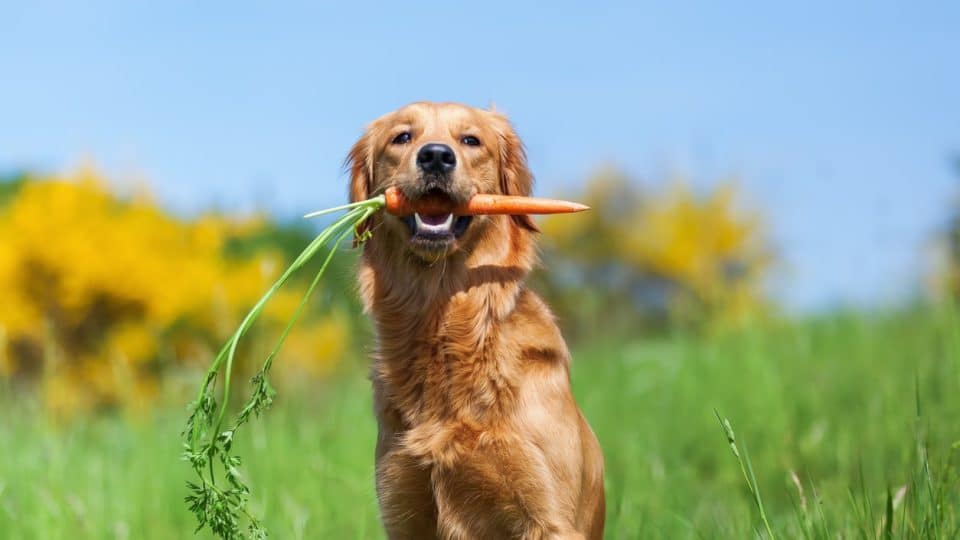We love carrots in all kinds of foods, from hearty stews to delicious carrot cake. But do you ever wonder if your pup can eat this wonderful veggie, too? Yes! Dogs can eat carrots, and they make healthy snacks when given in moderation.
“Carrots can be given daily to dogs as a treat,” says Dr Nell Ostermeier, veterinarian and spokesperson with Figo Pet Insurance. However, carrots aren’t a replacement for balanced meals, so keep portion sizes appropriate: a baby carrot for small dogs and a whole carrot for medium to large dogs.
Here’s what else to know about carrots’ nutritional benefits and how best to prepare them for your dog.
Are Carrots Nutritious for Dogs?
Carrots are a fantastic low-calorie treat, and your dog’s complete and balanced food likely already includes them for their nutritional benefits. Plus, many dogs love carrots for their crunch and slightly sweet flavour.
Dr Kelly Hood, a veterinarian and in-house expert at Pet Portraits, says serving carrots raw or frozen is generally best for your dog because they have no added ingredients and pack all the nutrients. Below are some common carrot prep methods and if they’re safe for dogs.
| Carrot Prep Method | Is It Dog-Safe? |
| Raw | Yes |
| Roasted | Yes, if only a small amount of cooking oil is used and not given to fat-intolerant dogs. Skip extra seasonings. |
| Boiled | Yes |
| Fried | Yes, if your dog is not fat-intolerant. |
| Steamed | Yes, this is a good choice for senior dogs who may have a tough time chewing crunchy foods. “Just let them cool down completely before they dig in to avoid any burned tongues,” Dr Hood adds. |
| Mashed | Yes |
| Frozen | Yes |
| Canned | No. “This is one form I’d definitely avoid,” Dr Hood says. “A lot of times they have added sugars and sodium that aren’t great for dogs and can contribute to weight gain or other health issues down the line.” |
What Are the Health Benefits of Carrots?
“Carrots are very rich in beta-carotene, which converts to vitamin A,” Dr Hood explains. Plus, the fibre in carrots is great for dogs’ digestion, and they’ll get a little boost of potassium, vitamin K1, vitamin C, and B6, she adds. In other words, by giving your dog carrots in moderation, you’re supporting their:
- eyesight
- immune system
- coat
- digestive health
- heart health
Board-certified veterinary nutritionist Dr Lindsey Bullen says if your dog is overweight or on a strict diet, carrots are a great low-calorie treat alternative to the fatty treats found in stores. They’re predominantly water, after all.
While chewing crunchy carrots may offer some oral health benefits, they’re not a replacement for daily brushing and regular dental cleanings recommended by your vet.
What Are the Risks of Dogs Eating Carrots?
Whole carrots are safe for dogs, including the leafy greens and skin. However, there are a few risks to keep in mind:
1. Choking
Dr Bullen recommends cutting carrots into bite-sized pieces, especially for smaller dogs. This will help prevent choking or digestive blockages.
2. Digestive upset
Because carrots are high in fibre, too many can cause diarrhoea, vomiting, gas, or other gastrointestinal discomfort. Dr Hood recommends feeding gradually and in small quantities, especially for dogs who haven’t had the veggie before.
3. Weight gain
While the natural sugars in carrots are fine in moderation, overdoing it can lead to weight gain.
4. Vitamin A toxicity
It’s unlikely, Dr Hood says, but feeding your dog loads of carrots could lead to vitamin A toxicity.
8 Easy Carrot Recipes For Dogs
There are so many mouth-watering carrot recipes for you and your dog to explore. Dr Hood’s favourite dog-friendly carrot recipe is dehydrated carrot chews. Here are the steps:
- Wash and thinly slice carrots (1/8 inch/0.3 cm thick).
- Arrange in a single layer on dehydrator trays.
- Dehydrate at 50-60°C (125-135°F) for six to eight hours, or until dry and brittle.
- Cool completely, then store in an airtight container.
What Other Fruits & Veggies Are Safe for Dogs to Eat?
There are many other safe and delicious fruits and vegetables for your dog, including the following.
- watermelon
- strawberries
- blueberries
- apple slices
- brussels sprouts
- butternut squash
- cabbage
- celery
- green beans
- kale
- peas
- sweet potatoes
Just read up on each one before you give them to your dog. In some cases, some parts of the fruits and vegetables may be safe, whereas other parts aren’t.
Remember, treats, including fruits and veggies, are best enjoyed in moderation. To ensure your dog receives a complete and balanced diet with all the essential nutrients, Dr Marge Chandler, a board-certified veterinary nutritionist, recommends limiting treats, including carrots, to no more than 10% of your dog’s daily calories.



